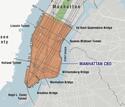St. Louis has more miles of light rail than any other Midwestern urban area, yet fewer people rode St. Louis transit in 2019 than in 1991, before the region opened its first mile of light rail. read more »
Transportation
Implications of Shifts in Commuting
There has been much speculation about how travel behavior has changed in the wake of the COVID pandemic. The answer to that important question is now coming into view. read more »
- Login to post comments
Imagine no jets, ships, defense, or space program!
Over the last 200 years, when the world populated from 1 to 8 billion, we learned that crude oil is virtually useless unless it’s manufactured (refineries) into oil derivatives read more »
- Login to post comments
2022 ACS Transportation Data
About 5.0 million Americans relied on transit to get to work in 2022, according to American Community Survey data released by the Census Bureau last week. read more »
Will the UAW Strike Perpetuate the Death Spiral Already Mandated for the Auto Industry?
The UAW strike that began September 14th by 146,000 UAW union members seeking a 46 percent pay raise, and a 32-hour week with 40 hours of pay, and restoration of traditional pensions read more »
- Login to post comments
Unsold Electric Cars May Be Signaling a Death Spiral for the Auto Industry
With new EV inventories beginning to increase on dealer lots, the auto industry has many challenges such as locating the buyers that may have serious concerns about a wide range of issues related to EVs read more »
- Login to post comments
New Jersey Challenges New York’s Cordon Fee Plan
With federal approval of New York’s environmental assessment, most of the federal, state, and local obstacles to New York City’s cordon pricing plan — which almost everyone erroneously calls a congestion pricing plan read more »
Amtrak Carried 86% of Pre-Pandemic PM in May
Amtrak carried 492 million passenger-miles in May 2023, which was just 86.4 percent of the 569 million passenger-miles it carried in the same month of 2019, according to Amtrak’s latest read more »
- Login to post comments
VMT Rears Its Ugly Head Again
So The Los Angeles Times ran a story today all about possible “congestion pricing” schemes coming soon to certain roads in the LA area soon. read more »
- Login to post comments
Green Jobs at Ford and GM Will Cost
Those “green” jobs you’ve been hearing about don’t come cheap.
Thanks to the staggering amounts of money that’s being doled out under the Inflation Reduction Act to incentivize the production of electric vehicles, America’s biggest automakers – General Motors and Ford Motor Company – are building battery factories. read more »






















